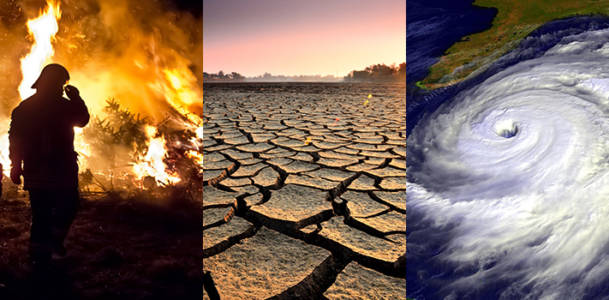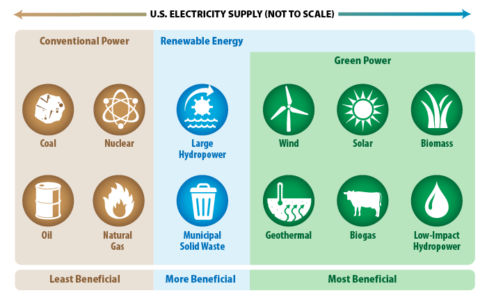Written by: Ian Thom & Elisabeth Gick
Words are profoundly important. Words serve as an essential tool in communicating with others. They can trigger powerful emotional reactions that call people to action or obfuscate the truth.

https://www.greenbiz.com/article/whats-right-word-climate-change
Is it Global Warming, Climate Change, or a Climate Crisis?
When speaking of the existential threat that our climate faces, many terms are often thrown around – global warming, climate change, climate crisis, and climate emergency to name a few. People often use these terms interchangeably; however, the nuances that distinguish these terms from one another can have profound implications. So what are the differences and why are they important? Well, let’s break them down.
Global warming is a term that rose to prominence in the 1970s and refers to the long-term global temperature increase the Earth has experienced since the industrial revolution and has escalated in recent decades. This term specifically focuses on the global temperature increase and does not encompass many of the additional dire effects we are experiencing, including sea level rise, glacial and arctic ice melt, and increased severe weather events. In order to incorporate these impacts, the term climate change was developed. As the National Aeronautics and Space Administration (NASA) described it “climate change refers to a broad range of global phenomena created predominantly by burning fossil fuels, which add heat-trapping gases to Earth’s atmosphere.”
In recent years, as global, national, and local organizations have failed to sufficiently act to prevent the degradation of our climate, new language that emphasizes the criticality of addressing this problem has become preferred. Terms like global warming and climate change are now seen as being too passive to properly depict the severity of the problem that scientists are describing. What is happening all around us is more accurately and truthfully described as a “climate emergency, crisis or breakdown.” Let’s use words that will inspire action. For who wouldn’t act in the time of an emergency or crisis?

https://climate.nasa.gov/resources/global-warming/
Is it Natural Gas, Fracked Gas, or Freedom Gas?
Colorado has experienced an explosion in fracking in recent years. With this boom has come the jockeying for the public’s opinion on the matter. Oil and gas companies have tried to conceal the harmful effects of this practice by changing the lexicon that is used to discuss it. The most prevalent example is referring to fracked gas as natural gas. It has become common practice to refer to it in this manner, but is there really anything natural about drilling down thousands of feet and fracking the bedrock that our communities reside upon? Referring to it as “natural” gas downplays the industrial operations that are performed to extract and process it.
In recent months, the US Department of Energy (DOE) has once again taken steps to try to change the language of the discussion. Instead of calling natural gas by its already undesirable name, top DOE leaders have referred to it as “freedom gas”. This insidious action is a blatant attempt to placate the public’s sentiment towards gas extraction and fracking as a whole. Instead, we should continue to refer to gas extracted via fracking as what it is, fracked gas. Referring to it as fracked gas constantly reminds people that this gas is produced through the dirty and destructive practice of fracking.
What type of energy should we strive for?
In the past few years, Colorado has been taking steps towards cleaner sources of energy. However, the words used to describe these energy sources can get confusing. What really is the difference between green and renewable energy, or carbon-free and carbon-neutral?
The Environmental Protection Agency (EPA) describes green power as “a subset of renewable energy and represents those renewable energy resources and technologies that provide the highest environmental benefit.” This includes energy produced from solar, wind, geothermal, biogas, and eligible biomass sources.
Renewable energy is derived from sources where the fuel is able to restore itself over time. This includes all the energy sources as green power but additionally includes hydroelectric resources. Hydropower using dams is produced by the movement of water, which is able to restore itself through the water cycle and thus can be classified as a renewable energy source but not a green energy source. The reason that hydropower does not also classify as a source of green power is that it often has externalities that can negatively impact the environment, such as the construction of dams impacting fish migration patterns and the ecological impacts of reservoirs.

https://www.epa.gov/greenpower/what-green-power
Clean energy sources refer to those that do not emit pollutants into the atmosphere. These sources are carbon-free and include solar, wind, geothermal, and hydroelectric. There is an ongoing debate as to whether or not biogas and biomass should be included as clean energy sources.
Unlike carbon-free energy sources, which emit no carbon into the atmosphere, carbon-neutral energy sources have the potential to discharge harmful pollutants. However, additional carbon removal technology is also implemented to offset its carbon emissions, yielding a net carbon emission of zero. Biofuels are an example of a carbon-neutral energy source. When biofuels are burned they release carbon into the atmosphere in the form of CO2, but the amount of carbon released is equal to the amount of carbon absorbed by the plants used to produce the biofuels. Therefore, the amount of net carbon emitting by biofuels is zero. However, we already have far too much carbon and other harmful gases in our atmosphere so utilizing carbon-neutral energy sources will not be enough to address the climate crisis. Instead, we must strive towards using sources of green power.
Let’s go and spread the word!
More information about climate lingo:
https://climate.nasa.gov/resources/global-warming/
https://www.epa.gov/greenpower/what-green-power
https://climatechange.ucdavis.edu/science/climate-change-definitions/
